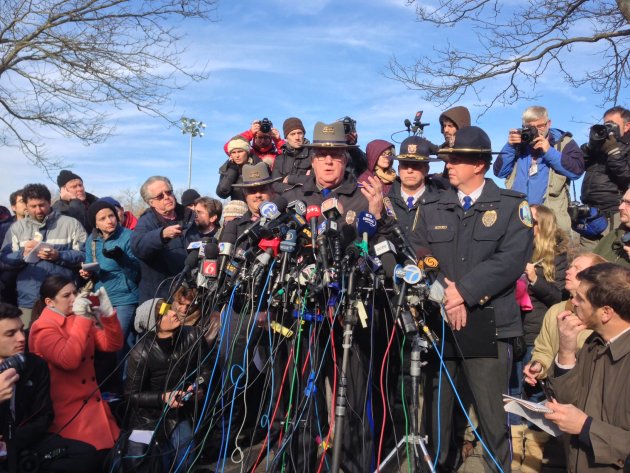PYONGYANG, North Korea (AP) — PYONGYANG, North Korea (AP) — North Korea parlayed the success of last week's rocket launch to glorify leader Kim Jong Un and his late father on Sunday, the eve of the first anniversary of his death.
The successful firing the rocket on Wednesday — ostensibly to place a satellite in space — was a clear sign that Kim will continue carrying out his father Kim Jong Il's policies even if they draw sanctions and international condemnation.
The West sees the rocket as a thinly-disguised way of carrying out U.N-banned tests of long-range missile technology, which it says not only threatens regional stability but is also a waste of resources when the country is struggling with a chronic food shortage.
There are concerns also that in upcoming weeks, Pyongyang will press ahead with a nuclear test, necessary in the march toward building a warhead small enough to be carried by a long-range missile.
At a somber memorial service Sunday, North Korea's top leadership eulogized Kim Jong Il and his son, who is certain to have gained national prestige and clout by going ahead with the rocket launch.
Kim Yong Nam, president of the Presidium of North Korea's parliament, credited Kim Jong Il with building Pyongyang's nuclear weapons program, and called the satellite launch a "shining victory" and an emblem of the promise that lies ahead with his son in power.
Top military official Choe Ryong Hae, meanwhile, warned that the army was prepared to defend the country's sovereignty.
Wednesday's launch was North Korea's second attempt in eight months to fulfill Kim Jong Il's 14-year quest to put a satellite into space. International experts confirmed that the rocket succeeding in reaching space.
Criticism of the launch was swift. The United States called it a covert test of missile technology, and U.N. Security Council condemned the launch as a violation of resolutions barring Pyongyang from developing its nuclear and missile programs.
However, the launch fit neatly into the preparations to mark the first anniversary of Kim's death and the rise of his young son.
Even before his death, Kim Jong Il had laid the ground for his son to inherit a government with national policies focused on science, technology and improving the economy. The son has been characterized as forward-thinking and tech-savvy — and the kind of man bold enough to take a gamble on a tricky rocket launch.
A launch in April, sent amid festivities to mark the centenary of the birth of North Korea founder Kim Il Sung, ended in failure shortly after liftoff.
Kim Jong Un made clear his intention to treat Wednesday's successful launch as a gift to his father.
He invited scientists in charge of the launch from a west coast launch pad to Pyongyang for the mourning rites, including a visit to the mausoleum where Kim Jong Il's body is believed to be lying in state "to report to him" on the success of the launch, according to state media.
Kim Jong Il's body has not been seen since the funeral that followed his Dec. 17, 2011, death of a heart attack. The mausoleum that houses the embalmed body of his father, Kim Il Sung, is expected to reopen this week. Both bodies will then be on display.
The mood in North Korea has been subdued this month in the run-up to the anniversary. However, news of the launch cheered people and the regime held a mass rally on Friday at the main plaza in Pyongyang.
Starting Saturday, North Koreans began streaming to a bronze statue of Kim on Mansu Hill and to Kim Il Sung Square to pay their respects, many laying white mourning flowers and bowing before his image.
On Sunday, a solemn Kim Jong Un joined the memorial service at the Pyongyang Indoor Stadium on the eve of the anniversary of Kim Jong Il's death.
Kim, whose entrances and exits usually are accompanied by a triumphant welcome song and a swell of cheers, entered the stage in silence, followed by top Workers' Party, government and Korean People's Army officials, as well as his aunt and uncle.
A military band played the militaristic "Song of Gen. Kim Jong Il" as officials and the audience bowed toward the massive portrait of Kim hung above the stage.
Tight security surrounded the gymnasium near Pyongyang's Pothong Gate. Armed soldiers in helmets posted along the street outside diverted traffic and pedestrians while more guarded every entrance to the building. The handful of foreign journalists allowed to cover the event, including The Associated Press, were searched by armed soldiers.
In his speech, Kim Yong Nam called Kim Jong Il a "peerless patriot" who strengthened the military and stood up to the United States.
The U.S. and North Korea signed a truce, not a peace treaty, at the close of the 1950-53 Korean War, and Pyongyang cites American troops in South Korea as a key reason for building its atomic weapons program.
As the hourlong ceremony came to a close, the band briefly played the mournful refrain to "The General Will Always be With Us." After the musicians put down their instruments, Kim Jong Un stood up and led a silent procession out.
___
AP writer Hyung-jin Kim contributed to this report from Seoul, South Korea. Follow AP's bureau chief for Pyongyang and Seoul at www.twitter.com/newsjean.












